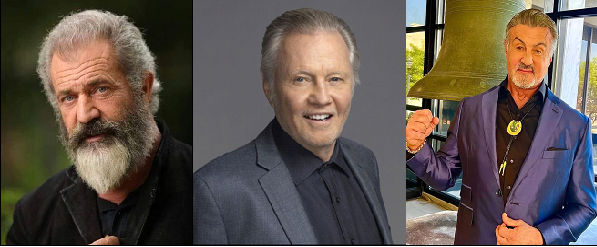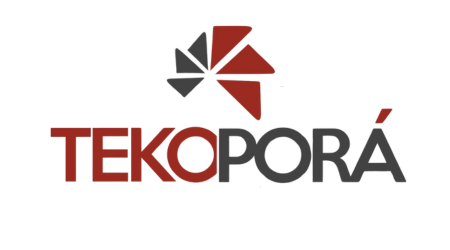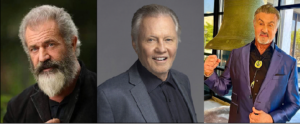Trump’s Unconventional Appointments: Mel Gibson, John Voight, and Sylvester Stallone as Ambassadors Before Hollywood

Imagenes: Cuenta de Redes sociales de los Embajadores ante Hollywood
In an unexpected and bold move, former President Donald Trump has appointed three prominent figures from the world of entertainment—Mel Gibson, John Voight, and Sylvester Stallone—as “Ambassadors Before Hollywood.” This unconventional decision has raised eyebrows across the globe, and it’s clear that the new appointments are emblematic of the Trump administration’s distinctive approach to diplomacy, cultural influence, and public relations.
The Rise of the Celebrity Ambassador
At a time when politics and entertainment are increasingly intertwined, Trump’s decision underscores a growing trend of celebrity influence in global affairs. The three actors, each with a legacy of bold, often controversial public personas, are tasked with serving as unofficial emissaries, a role that blends elements of cultural representation, public relations, and global image management.
The stated purpose behind this unique initiative is to foster stronger ties between the U.S. and key international audiences, especially in markets where Hollywood holds significant sway. With this move, the Trump administration aims to strengthen cultural diplomacy—using the appeal of Hollywood icons to shape perceptions of America, promote American values, and potentially open doors for future collaboration in both business and entertainment.
A Powerful Trio with Political Resonance
Mel Gibson
Mel Gibson, known for his Academy Award-winning work and his polarizing persona, is perhaps the most controversial of the trio. As a figure who has often found himself at the center of political and social debate, Gibson brings a unique perspective to the role. His experience in navigating both public scandals and international success makes him a fascinating figure to represent American interests. Gibson’s position in the Trump-era political landscape is noteworthy, as he has openly expressed support for conservative views and aligned himself with figures in the right-wing of U.S. politics.
Gibson’s appointment appears to serve a dual purpose: to bolster American influence in international media and culture while also reaching out to conservative audiences both in the U.S. and abroad. His credibility within certain circles, especially among right-leaning individuals, is likely to be an asset in this role.
John Voight
John Voight, a long-time Hollywood legend, is another key player in this new diplomatic endeavor. Known for his Oscar-winning career and outspoken political views, Voight has been a strong supporter of Trump’s policies and an advocate for American exceptionalism. As an elder statesman of the entertainment world, his stature in Hollywood and his vocal political stance make him an ideal candidate to bridge the gap between the U.S. and audiences who may feel disillusioned with traditional political figures.
Voight’s role as an ambassador before Hollywood is likely intended to further solidify Trump’s appeal among Hollywood’s conservative contingent while also reaching into foreign markets where Voight’s reputation as an iconic actor could help promote U.S. cultural exports.
Sylvester Stallone
Sylvester Stallone, the man behind the legendary characters of Rocky Balboa and John Rambo, adds another layer of muscle to the team. With his global fame and widespread recognition, Stallone is seen as an emblem of American strength, resilience, and grit. A symbol of the blue-collar, working-class ethos, Stallone’s persona transcends the entertainment industry. His appointment could serve to reinforce the idea of a strong, resilient America, capable of overcoming challenges, both at home and on the global stage.
Stallone’s political involvement has been more muted than that of Gibson and Voight, but his alignment with the Republican Party and his past involvement in charitable endeavors speaks to his potential to serve as a diplomatic figure. By bringing him into the fold, the Trump administration may be aiming to appeal to both American audiences and international markets, especially those that resonate with Stallone’s roles in action films.
Strategic Intent: Hollywood as a Global Soft Power Tool
Trump’s decision to appoint these actors reflects a broader strategic vision that blends soft power with entertainment. Hollywood has long been a cornerstone of American global influence, shaping international perceptions of American culture, values, and ideals. By positioning these celebrity ambassadors as cultural representatives, the former president seems to be recognizing the importance of leveraging Hollywood’s influence to build connections with other countries.
In practical terms, these appointments might involve engaging with global entertainment industries, fostering relationships with foreign governments, and encouraging U.S. businesses to invest in international film markets. The ambassadors could also be tasked with leading initiatives to promote American ideals such as individual freedom, free-market capitalism, and national pride through their public appearances and endorsements.
Global Reactions: A Divisive Move
Naturally, the appointments have been met with mixed reactions. Supporters of Trump see this as a shrewd use of celebrity influence to bolster America’s standing on the global stage, while critics argue that the move undermines the role of traditional diplomats and is yet another example of the former president’s penchant for populist, celebrity-driven politics.
Some international commentators have questioned the value of appointing individuals whose views on politics are seen as divisive in Hollywood and the wider cultural landscape. The trio’s conservative stances, particularly on issues such as the role of government in entertainment and social issues, may not sit well with liberal-leaning audiences, both in the U.S. and overseas.
Yet, in many parts of the world, the stars of Hollywood carry an undeniable sway, and their words can carry weight in ways that traditional diplomats cannot always match. Whether or not this unique approach succeeds in its diplomatic mission remains to be seen, but it’s clear that the Trump administration continues to employ unconventional methods in advancing American interests.
A New Frontier in Diplomacy?
The appointment of Mel Gibson, John Voight, and Sylvester Stallone as ambassadors before Hollywood represents a bold step in the intersection of politics and entertainment. Whether this initiative will succeed in strengthening America’s position globally or reinforce the partisan divide at home remains an open question. What is certain, however, is that Trump’s celebrity-driven diplomacy is far from traditional, and it signals a shift in how the U.S. may approach soft power in the 21st century.
As these new ambassadors prepare to take on their roles, the world will be watching closely to see whether Hollywood’s stars can shine as brightly in the diplomatic arena as they do on the silver screen.






